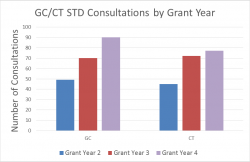Fighting STDs Together: A PTC Series
Introducing “Fighting STDs Together: A PTC Series,” a collaboration between NNPTC and NCSD, highlighting their work with PCHD recipients. This week’s article will include a brief overview of the NNPTCs regional and national centers and a few statistics from their Clinical Care Network.

Welcome to “Fighting STDs Together: A PTC Series.” This series highlights the pivotal work between PCHD grant recipients. The NNPTC consists of eight regional PTCs, each serving a specific area of the US.
The NNPTC’s National Centers work focuses on specialized projects, and include the National Coordination Center, National Evaluation Center, National Quality Improvement Center, and the National Curriculum Center. One of the NNPTC’s most popular resources is the CDC-funded STD Clinical Consultation Network (STD CCN). STD CCN is a free consultation service that connects healthcare providers to expert STD faculty at all eight regional Prevention Training Centers (PTCs) through an online portal with the goal of improving STD diagnosis, care, management, and prevention nationally. Faculty at the Regional STD Prevention Training Centers provide STD clinical consultation and technical assistance (TA) to healthcare providers and their organizations within one to five business days, depending on urgency. The service is intended for licensed healthcare professionals and does not provide direct medical care, treatment planning, or medical treatment services to individuals.
The PCHD Connection & How Do We Use This Data?
Each of the eight regional PTCs analyzes the STD CCN consultation data from the states they serve. There are important questions the regional centers can evaluate: What geographic location are the most questions asked and who is asking? What STD elicits the most questions and how can we fill that gap in our trainings? As you will see in the data below, most of our questions, nationwide, come from both local and state health departments. And currently the most frequently asked questions pertain to the serologic management of syphilis. Let’s now take a deeper dive into the data.
Each grant year, both the STD clinical consults and technical assistance requests have increased. Since the inception of STD CCN in 2015, STD CCN has provided over 1,450 STD medical consultations and 330 technical assist. The NNPTC National Coordination Center (NCC) recently reported grant year four data (GY4, April 1, 2017 –March 31, 2018) to the CDC.
STD Clinical Consultation Network
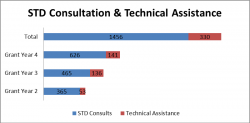
Syphilis STD Consultations on STD CCN
For the third year in a row, syphilis continues to generate the most requests with 64% (398 consultations) of the 626 total STD consultations. Of the syphilis consultations requested, 36.9% (147 consultations) were about syphilis serologic management, 42 consultations were about syphilis staging, 38 were about ocular/neurosyphilis, 35 were about treating patients with antibiotic allergies, and 76 fell into the category of “other.”
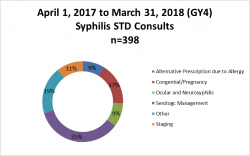
But Don’t Forget About Chlamydia and Gonorrhea
The NNPTC network received a wide variety of STD consultations the top three most requested STD consultations; syphilis, chlamydia, and gonorrhea. In GY4 (April 1, 2017 to March 31, 2018) 14% (90 consultations) were on gonorrhea (GC) and 12% (77 consultations) were on chlamydia (CT) and when comparing GY3 (April 1, 2016 to March 31, 2018) to GY4, GC consultations increased by 29% (20) and CT increased slightly by 7% (5).
Gonorrhea & Chlamydia STD Consultation
Where Are the Consults Coming From?
The graph below captures the occupational setting of requesting providers for STD consultations. Similar to TA requests, state and local health departments lead the increase in STD consultation; there was a 54% (91 consults) increase in use from 2016 – 2017 to the 2017 -2018 grant years in consultations from state and local health departments. For primary care settings, there was an 18% (18 consults) increase in use from 2016 – 2017 to the 2017 -2018 grant years in consultations from providers working in primary care settings. Finally, there is a jump in consultations from academic institutions by 53% (23 consults).
STD Consultations by Occupational Setting & Grant Year
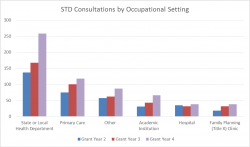
What about Morbidity?
STD CCN had a steady increase in usage, particularly among health departments, primary care, and academic institutions. Overall clinical STD consultation requests increased 35% and TA requests increased 4% over the previous year (2016-2017). STD CCN consultations have increased for all bacterial STDs – Chlamydia, Gonorrhea and Syphilis; mirroring the national trends on increasing STD rates.
Nationally, STD CCN is reaching high morbidity areas almost 80% (79.4%) of the time in GY4. Below, a map shows STD CCN consults by county in GY4.
TA and STD Medical Consults by Morbidity

STD CCN Medical Consultation & TA Request by County, GY4
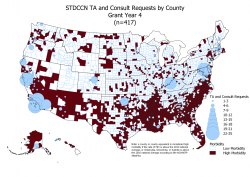
Future Directions
Each day the NNPTC National Coordination Center (NCC) is copied on each consult coming into STD CCN. The NNPTC’s eight regional centers field, triage, and assign to experts some of the toughest STD questions out there, and we love it. Helping clinicians learn how to assess risk, test, and treat STDs is our lifelong work. With the release of the 2020 CDC STD Treatment Guidelines STD CCN will only continue to grow and expand. If you need us, we are only a click away.
